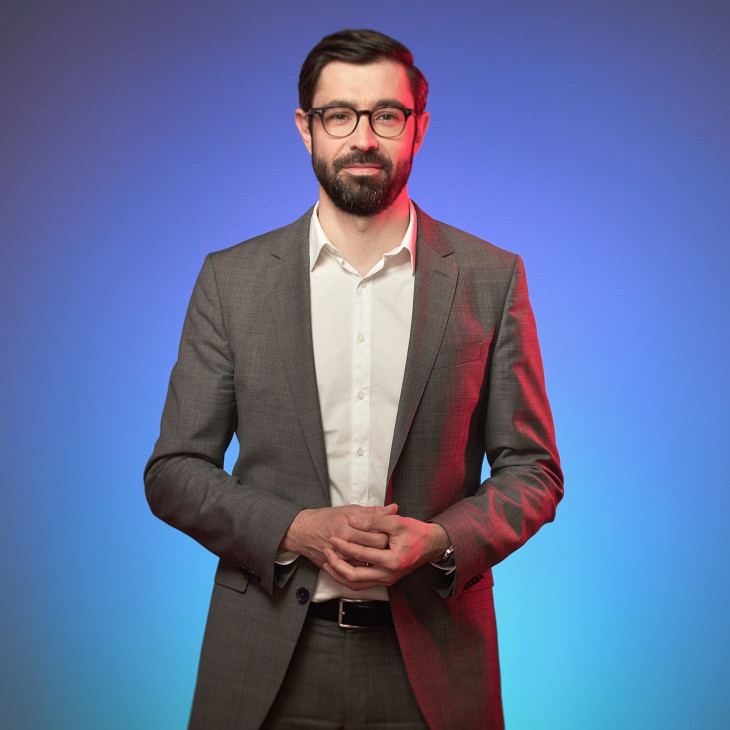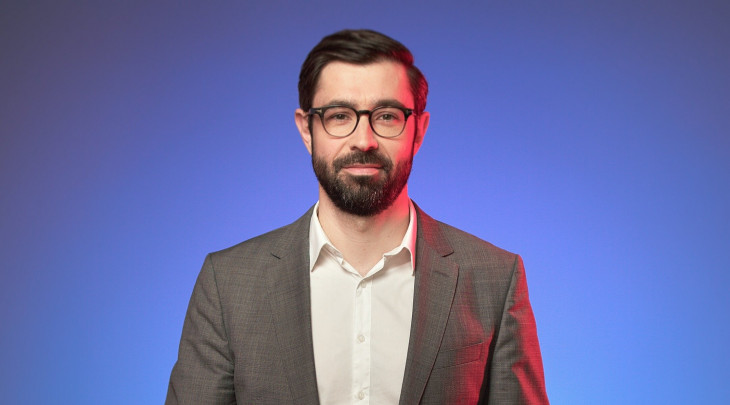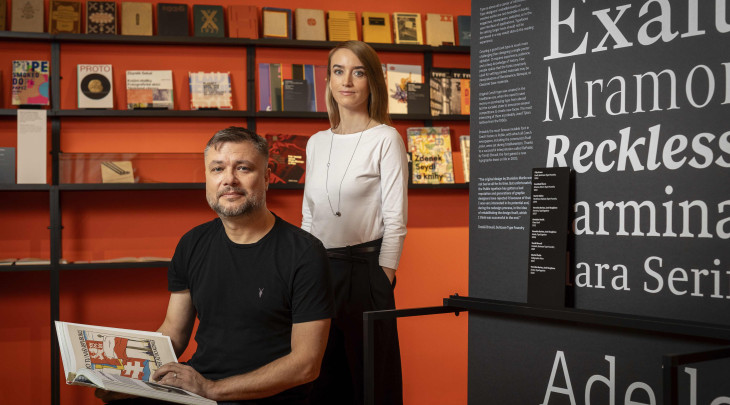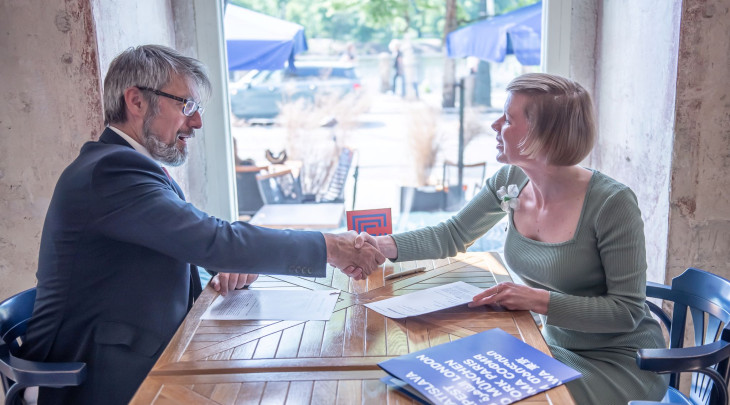INTERVIEW: (Not just) about Visions for Europe
- 30. 06. 2022
- News
- 7 minute read

Tomáš was Director of Czech Centre Berlin and carried out a number of fascinating projects in Germany. A few years later, he returned to Czech Centres’ Prague headquarters as Deputy Director General. Since the start of 2021 he has been working with a team of colleagues on the Czech Centres’ programme for the EU Presidency, a team he is leading. He is also the author of the Visions for Europe concept, which overarches the entire programme. How easy (or not) the vision is to implement, what managing ten projects simultaneously all entails, and what it’s like to work again in the Czech Republic – you’ll find all this out in our interview with TOMÁŠ SACHER, HEAD OF THE CZECH CENTRES EU PRESIDENCY PROGRAMME.
Petra Jungwirthová asked.
The motto for the Czech Centres’ EU Presidency Programme is Visions for Europe. Why did you choose this motto, and how did you go about setting up the whole programme?
We’ve been working on it since the start of 2021, and we already knew then that we didn’t want to showcase purely Czech projects and people. The core idea was rather to embrace the ideas and challenges which we share in Europe with other nations.
What was your framework?
We set out three core strands – sustainability, creativity and innovation. It was on these that we set up our projects. At the same time, the entire programme is focused on the future, and it endeavours to find paths to make it the best it can be. And hence our motto, Visions for Europe, in which we ask specific figures involved in cultural activities regarding the EU Presidency about their visions for Europe.
There are a total of ten EU Presidency projects: how did you select them?
To begin with, we did research in a number of European countries, in which we tried to find the best and most successful past projects for inspiration. We came up with a broad range of topics and formats to consider. These were often entirely new ideas, but they were also often national projects already in existence which could be “promoted” to the European level. This applies to Literature Night and the Václav Havel European Dialogues. We selected ten projects from the original range which best met our objectives, meaning that they work with current issues, are set around dialogue with international partners and they are also, shall we say, malleable in how they can be implemented. This means they can be easily adapted to specific ambitions within different foreign destinations.
It is a programme which is entirely unique, and it goes far beyond standard programme set-ups. What was most difficult?
Enthusing the entire network for a common cause. Each Czech Centre is specific, and its director has the best perspective of what topics and formats work best in their particular country. Projects put together for the whole network from a single centre have a trickier position in this regard. However, that’s one reason why we completed the arrangements within an international team. And in some sense the pandemic also helped us, intensifying online communication. Suddenly we all began using video conferences and online formats more, which were shared for our whole network.
The Czech EU Presidency is taking place at a difficult time. COVID has been displaced by something worse: the war in Ukraine. Do you think that a period of such profound crises could bring Europe together more?
It already has: Europe has handled the first crucial phase of our joint response to Russia’s aggression well. The second phase will be even more difficult, however. Along with the impacts of the war and economic pressure on European society, there is growing insecurity and dissatisfaction and our current unity may become eroded. But I still remain an optimist. The Ukrainians have reminded us all that a united Europe is something we need to appreciate and we’ve got to fight for it.
Presidency of the European Union is far from a mere political role, and carries over into community and cultural levels …
Of course the cultural and community level gives political co-operation the necessary depth. It builds on the shared values and principles which are necessary for creating a feeling of European belonging. We are also naturally working with the issue of Ukraine in specific cultural projects in which we are engaging Ukrainian artists and collaborating in their implementation in other ways.
In one of his interviews, Foreign Minister Jan Lipavský said that the Foreign Ministry perceives Czech Centres as an important partner which can operate well at an informal level.
For Czech Centres abroad, co-operation with embassies is crucial, and yes, we can often help in setting up contacts and new plans wherever an informal atmosphere works better. Our diplomatic missions also often help at our events, their presence giving them weight and importance. In general, the energy of people working abroad to further the Czech Republic should be aggregated. I think these projects for the EU Presidency fulfil this. They are the result of the joint work of our colleagues in Prague, Czech Centres abroad and very often also our diplomats.
You were quite recently the Director of the Czech Centre Berlin, and you are a former journalist. What does the Czech Republic’s Presidency of the European Union mean to you personally?
It’s the culmination of many years of work in which I saw the EU and Europe as a key motif for most topics I dealt with. Even in Berlin I was managing the EUNIC network of European cultural institutes as well as working for the Czech Centre, and I see myself as a European just as much as I do a Czech. The Presidency is a massive opportunity for the Czech Republic to raise its profile in Europe and the world. We’re going to be hosting the debate on shared challenges, problems and values for half a year. And that’s a huge opportunity to establish new contacts and strengthen our ties to our European neighbours in political, but also cultural and economic, terms.
You returned to Czech Centres headquarters as Deputy Director General recently, and you are currently the head of the CZ PRES project.
Yes, and I must say that I’m enjoying my day-to-day work here in the Czech Republic. Czech society has responded to the Ukrainian crisis in the best possible way, and in general I see that the people here are very open and motivated to get through this difficult situation together. I’m also enjoying much more intensive contact with living Czech culture.
What do you most appreciate?
The best possible outcome of our work on the EU Presidency, and here I don’t just mean our work, but the work of all who have come into contact with it or are following it in some way, would be if Czechs themselves could take the most possible out of it.
Thank you for the interview, and we look forward to continuing along the European path. The VISIONS FOR EUROPE project is launched on 1 July 2022 on the website: www.visionsforeurope.cz
TOMÁŠ SACHER worked as a journalist for many years (Respekt, Reportér, CICERO), in which he focused on the EU, headed the economics section and regularly reported from Europe, and also, e.g., from the Balkans, Ukraine and Russia. He undertook a number of projects with international involvement, and moderated public debates and conferences focused on society, politics and economics, the EU and Czech-German relations – regularly, for example, at the Václav Havel Library. He was Director of the Czech Centre Berlin from 2016, and he also managed the EUNIC network of European cultural institutes in Berlin. Since 2020, he has been the Deputy Director General of the Czech Centres and head of the Czech Centres programme for the CZ PRES, which represents the most extensive and most series of events ever, focused on one specific issue with the involvement of all Directors of Czech Centres abroad.
Newsletter of the Czech Centres - June 2022
INTERVIEW: (Not just) about Visions for Europe
Tomáš was Director of Czech Centre Berlin and carried out a number of fascinating projects in Germany. A few years la...
You could be interested in
PF 2026
Thank you for your support and goodwill over the past year. Czech Centres wish you peaceful and joyful Christmas...
Interview with the authors of the Identity exhibition – the story of Czech graphic design
The exhibition on Czech graphic design, prepared by Filip Blažek and Linda Kudrnovská, is part of the multi-format...
Memorandum about the cooperation between the Czech Centre and the Aspen Institute Central Europe
On Monday the 26th of May, Jitka Pánek Jurková and Jakub Landovský signed a memorandum regarding the cooperation...


